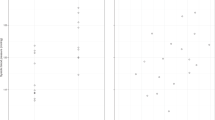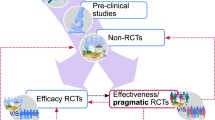Sample size calculations for continuous outcomes in clinical nutrition
In nutrition research, sample size calculations for continuous outcomes are important for the planning phase of many randomized trials and could also be relevant for some observational studies such as cohort and cross-sectional studies. However, only little literature dedicated to this topic exists within nutritional science. This article reviews the most common methods for sample size calculations in nutrition research. Approximate formulas are used for explaining concepts and requirements and for working through examples from the literature. Sample size calculations for the various study designs, which are covered, may all be seen as extensions of the sample size calculation for the basic two-group comparison through the application of suitable scaling factors and, possibly, modification of the significance level. The latter is needed for sample size calculations for multi-group designs and designs involving multiple primary outcomes. Like cluster-randomized designs, these types of study designs may be more challenging than standard sample size calculations. In such non-standard scenarios, there may be a need for consulting a biostatistician. Finally, it should be stressed that there may be many ways to plan a study. The final sample size calculation provided for a grant applicant, study protocol, or publication will often not only depend on considerations and input information as described in this article but will also involve restrictions in terms of logistics and/or resources.
This is a preview of subscription content, access via your institution
Access options
Subscribe to this journal
Receive 12 print issues and online access
265,23 € per year
only 22,10 € per issue
Buy this article
- Purchase on SpringerLink
- Instant access to full article PDF
Prices may be subject to local taxes which are calculated during checkout
Similar content being viewed by others

Statistical analysis of continuous outcomes from parallel-arm randomized controlled trials in nutrition—a tutorial
Article 16 September 2020

Optimizing clinical nutrition research: the role of adaptive and pragmatic trials
Article 15 September 2023

Errors in the implementation, analysis, and reporting of randomization within obesity and nutrition research: a guide to their avoidance
Article Open access 29 July 2021
Data availability
All data used are provided in the paper.
References
- Bacchetti P, Wolf LE, Segal MR, McCulloch CE. Ethics and Sample Size. Am J Epidemiol. 2005;161:105–10. ArticlePubMedGoogle Scholar
- Nelson M, Margetts BM. Design, planning, and evaluation of nutritional epidemiological studies. 2nd ed. In: Margetts BM, Nelson M, editors. Design Concepts in Nutritional Epidemiology. Oxford:Oxford University Press;1997.
- Cole TJ. Sampling, study, and power. 2nd ed. In: Margetts BM, Nelson M, editors. Design Concepts in Nutritional Epidemiology. Oxford: Oxford University Press; 1997.
- Zhang W, Liu A, Zhang Z, Nansel T, Halabi S. Best (but oft-forgotten) practices: sample size and power calculation for a dietary intervention trial with episodically consumed foods. Am J Clin Nutr. 2020;112:920–5. ArticlePubMedPubMed CentralGoogle Scholar
- Saracino G, Jennings LW, Hasse JM. Basic statistical concepts in nutrition research. Nutr Clin Pract. 2013;28:182–93. ArticlePubMedGoogle Scholar
- Harris JE, Raynor HA. Crossover Designs in Nutrition and Dietetics Research. J Acad Nutr Dietetics. 2017;117:1023–30. ArticleGoogle Scholar
- Chow S-C, Shao J, Wang H, Lokhnygina Y. Sample Size Calculations in Clinical Research. 3rd ed. Boca Raton:CRC Press; 2018.
- Tukey JW. Tightening the clinical trial. Controlled Clin Trials. 1993;14:266–85. ArticlePubMedCASGoogle Scholar
- Hoenig JM, Heisey DM. The Abuse of Power: The Pervasive Fallacy of Power Calculations for Data Analysis. Am Statistician. 2001;55:19–24. ArticleGoogle Scholar
- Fabiansen C, Yamééogo CW, Iuel-Brockdorf A-S, Cichon B, Rytter MJH, Kurpad A, et al. Effectiveness of food supplements in increasing fat-free tissue accretion in children with moderate acute malnutrition: a randomised 2 × 2 × 3 factorial trial in Burkina Faso. PLoS Med. 2017;14:e1002387. ArticlePubMedPubMed CentralGoogle Scholar
- Kehlet U, Kofod J, Holst JJ, Ritz C, Aaslyng MD, Raben A. Addition of Rye Bran and Pea Fiber to Pork Meatballs Enhances Subjective Satiety in Healthy Men, but Does Not Change Glycemic or Hormonal Responses: a Randomized Crossover Meal Test Study. J Nutr. 2017;147:1700–8. PubMedCASGoogle Scholar
- Brown T, Ross L, Jones L, Hughes B, Banks M. Nutrition outcomes following implementation of validated swallowing and nutrition guidelines for patients with head and neck cancer. Supportive Care Cancer. 2014;22:2381–91. ArticleGoogle Scholar
- Kiefer E, Hoover DR, Shi Q, Dusingize JC, Cohen M, Mutimura E, et al. Association of pre-treatment nutritional status with change in CD4 count after antiretroviral therapy at 6, 12, and 24 months in Rwandan women. PloS ONE. 2011;6:e29625. ArticlePubMedPubMed CentralCASGoogle Scholar
- Laursen R, Larnkjær A, Ritz C, Hauger H, Michaelsen KF, Mølgaard C. Probiotics and Child Care Absence Due to Infections: A Randomized Controlled Trial. Pediatrics. 2017;140:e20170735. ArticlePubMedGoogle Scholar
- Raben A, Vestentoft PS, Brand-Miller J, Jalo E, Drummen M, Simpson L, et al. PREVIEW - Results from a 3-year randomised 2 x 2 factorial multinational trial investigating the role of protein, glycemic index and physical activity for prevention of type-2 diabetes. Diabetes Obes Metab. 2021;23:324–37. ArticlePubMedCASGoogle Scholar
- Julious SA. Sample sizes for clinical trials with Normal data. Stat Med. 2004;23:1921–86. ArticlePubMedGoogle Scholar
- Hsieh FY, Lavori PW, Cohen HJ, Feussner JR. An overview of variance inflation factors for sample-size calculation. Eval Health Prof. 2003;26:239–57. ArticlePubMedCASGoogle Scholar
- R Core Team (2021). (2020). R: A language and environment for statistical computing. Vienna:R Foundation for Statistical Computing. https://www.R-project.org/.
- Rutterford C, Copas A, Eldridge S. Methods for sample size determination in cluster randomized trials. Int J Epidemiol. 2015;44:1051–67. ArticlePubMedPubMed CentralGoogle Scholar
- Raziani F, Tholstrup T, Kristensen MD, Svanegaard ML, Ritz C, Astrup A, et al. High intake of regular-fat cheese compared with reduced-fat cheese does not affect LDL cholesterol or risk markers of the metabolic syndrome: a randomized controlled trial. Am J Clin Nutr. 2016;104:973–81. ArticlePubMedCASGoogle Scholar
- Hothorn T, Bretz F, Westfall P. Simultaneous inference in general parametric models. Biometrical J. 2008;50:346–63. ArticleGoogle Scholar
- Große Ruse M, Ritz C, Hothorn LA. Simultaneous inference of a binary composite endpoint and its components. J Biopharmaceutical Stat. 2017;27:56–69. ArticleGoogle Scholar
- Friis H, Mwaniki D, Omondi B, Muniu E, Thiong’o F, Ouma J, et al. Effects on haemoglobin of multi-micronutrient supplementation and multi-helminth chemotherapy: a randomized, controlled trial in Kenyan school children. Eur J Clin Nutr. 2003;57:573–9. ArticlePubMedCASGoogle Scholar
- Leon AC, Heo M. Sample sizes required to detect interactions between two binary fixed-effects in a mixed-effects linear regression model. Comput Stat Data Anal. 2009;53:603–8. ArticlePubMedPubMed CentralGoogle Scholar
- Hongisto SM, Paajanen L, Saxelin M, Korpela R. A combination of fibre-rich rye bread and yoghurt containing Lactobacillus GG improves bowel function in women with self-reported constipation. Eur J Clin Nutr. 2006;60:319–24. ArticlePubMedCASGoogle Scholar
- Jones B, Kenward MG. Design and Analysis of Cross-Over Trials. 3rd ed. Boca Raton:CRC Press; 2015.
- Donner A, Klar N. Design and Analysis of Cluster Randomization Trials in Health Research. Chichester:John Wiley & Sons; 2000.
- Hemming K, Eldridge S, Forbes G, Weijer C, Taljaard M. How to design efficient cluster randomised trials. BMJ. 2017;358:j3064. ArticlePubMedPubMed CentralCASGoogle Scholar
- Thompson DM, Fernald DH, Mold JW. Intraclass correlation coefficients typical of cluster-randomized studies: estimates from the Robert Wood Johnson Prescription for Health projects. Ann Fam Med. 2012;10:235–40. ArticlePubMedPubMed CentralGoogle Scholar
- van Breukelen GJ, Candel MJJM. Calculating sample sizes for cluster randomized trials: we can keep it simple and efficient! J Clin Epidemiol. 2012;65:1212–8. ArticlePubMedGoogle Scholar
- Kerry SM, Bland JM. Statistics notes: Sample size in cluster randomisation. BMJ. 1998;316:549. ArticlePubMedPubMed CentralCASGoogle Scholar
- Arnup SJ, McKenzie JE, Hemming K, Pilcher D, Forbes AB. Understanding the cluster randomised crossover design: a graphical illustration of the components of variation and a sample size tutorial. Trials. 2017;18:381. ArticlePubMedPubMed CentralGoogle Scholar
- Gupta A, Kant S, Ramakrishnan L, Pandey RM, Khandelwal R, Kapil U, et al. Impact of daily-supervised administration of a package of iron and folic acid and vitamin B12 on hemoglobin levels among adolescent girls (12−19 years): a cluster randomized control trial. Eur J Clin Nutr. 2021;75:1588–97. ArticlePubMedCASGoogle Scholar
- Kramer MS, Chalmers B, Hodnett ED, Sevkovskaya Z, Dzikovich I, Shapiro S, et al. PROBIT Study Group (Promotion of Breastfeeding Intervention Trial). Promotion of Breastfeeding Intervention Trial (PROBIT): a randomized trial in the Republic of Belarus. JAMA 2001;285:413–20. ArticlePubMedCASGoogle Scholar
- Senn S, Bretz F. Power and sample size when multiple endpoints are considered. Pharm Stat. 2007;6:161–70. ArticlePubMedGoogle Scholar
- Sugimoto T, Sozu T, Hamasaki T. A convenient formula for sample size calculations in clinical trials with multiple co-primary continuous endpoints. Pharm Stat. 2012;11:118–28. ArticlePubMedGoogle Scholar
- Yang J, Li J, Wang S, Luo L, Liu P. Comparison of three sample size calculation methods for non-inferiority vaccine trials with multiple continuous co-primary endpoints. Hum Vaccines Immunother. 2019;15:256–63. ArticleGoogle Scholar
- Damsgaard CT, Lauritzen L, Hauger H, Vuholm S, Teisen MN, Ritz C, et al. Effects of oily fish intake on cardiovascular risk markers, cognitive function, and behavior in school-aged children: study protocol for a randomized controlled trial. Trials. 2016;17:510. ArticlePubMedPubMed CentralGoogle Scholar
- Geiker NR, Ritz C, Pedersen SD, Larsen TM, Hill JO, Astrup A. A weight-loss program adapted to the menstrual cycle increases weight loss in healthy, overweight, premenopausal women: a 6-mo randomized controlled trial. Am J Clin Nutr. 2016;104:15–20. ArticlePubMedCASGoogle Scholar
- Sahu SK, Smith TMF. A Bayesian method of sample size determination with practical applications. J R Stat Soc: Ser A. 2006;169:235–53. ArticleGoogle Scholar
- Noordzij M, Tripepi G, Dekker FW, Zoccali C, Tanck MW, Jager KJ. Sample size calculations: basic principles and common pitfalls. Nephrol Dialysis Transplant. 2010;25:1388–93. ArticleGoogle Scholar
- Hemming K, Girling AJ, Sitch AJ, Marsh J, Lilford RJ. Sample size calculations for cluster randomised controlled trials with a fixed number of clusters. BMC Med Res Methodol. 2011;11:102. ArticlePubMedPubMed CentralGoogle Scholar
- Kangas S, Salpéteur C, Nikièma V, Talley L, Ritz C, Friis, et al. Impact of reduced dose of ready-to-use therapeutic foods in children with uncomplicated severe acute malnutrition: a randomised non-inferiority trial in Burkina Faso. PLOS Med. 2019;16:e1002887. ArticlePubMedPubMed CentralGoogle Scholar
- Julious SA, Campbell MJ. Tutorial in biostatistics: sample sizes for parallel group clinical trials with binary data. Stat Med. 2012;31:2904–36. ArticlePubMedGoogle Scholar
- Ritz C. Statistical analysis of continuous outcomes from parallel-arm randomized controlled trials in nutrition – a tutorial. Eur J Clin Nutr. 2021;75:161–70. Google Scholar
Author information
Authors and Affiliations
- National Institute of Public Health, University of Southern Denmark, Studiestræde 6, DK-1455, Copenhagen K, Denmark Christian Ritz
- Department of Nutrition, Exercise and Sports, University of Copenhagen, Rolighedsvej 26, DK-1958, Frederiksberg C, Denmark Mette Frahm Olsen, Benedikte Grenov & Henrik Friis
- Christian Ritz




